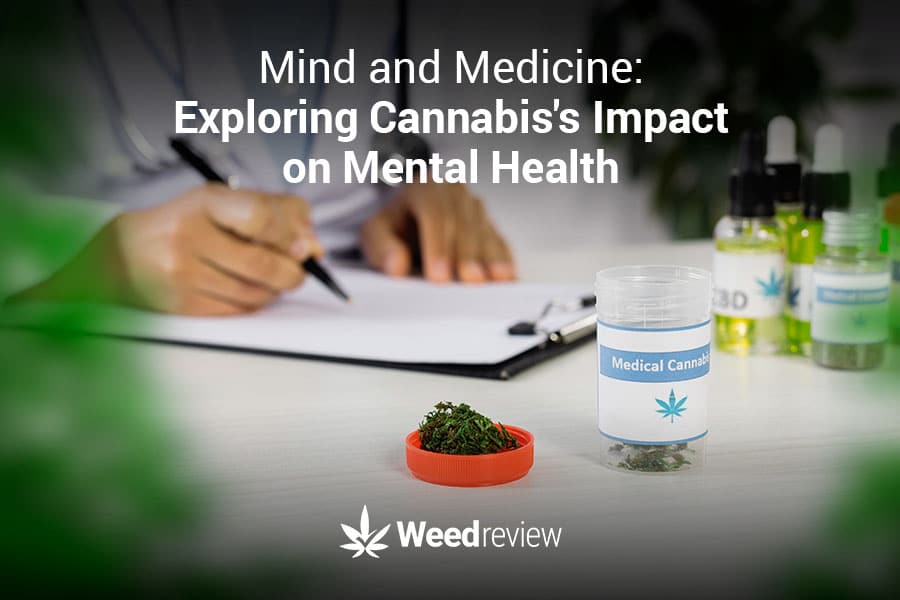
From Chill to Chaos: How Cannabis Affects Mental Health

Table of Contents
Marijuana has long been portrayed as a ticket to a carefree, relaxed state of mind. From movies to TV shows, the image of someone smoking cannabis and suddenly feeling happy, calm, and at peace is well-known. But the truth about the cannabis plant’s effects on the human mind is far more complex than this idyllic picture suggests.
As we will see, the relationship between marijuana and mental health issues is full of contradictions. Some people may benefit, while others may not find that much comfort. Ultimately, it depends on a wide range of factors.
What the science says
Cannabis is often referred to as a plant with over a thousand molecules, while the human brain is considered the most complexly organized structure in the universe. Given these facts, it’s hardly surprising that the effects of cannabis on the brain are not yet fully understood.
Although we have some knowledge of what marijuana does to the mind and how it interacts with the body, there is still much that we don’t know, particularly in the context of mental illness. More analysis and long-term clinical studies are essential here.
The section below attempts to summarise the key findings that relate to the use of cannabis and different mental health conditions.
Anxiety & stress
Easing anxiety and stress are among the top reasons people consume medical cannabis. After all, smoking a joint after a long day of work can help you unwind and relax. But, scientifically speaking, the proof of this is on the lower side.
In low doses, THC (the psychoactive component of marijuana) is relaxing, but in high doses, it can increase anxiety. In other words, taking too much weed can make you more anxious.
Similarly, CBD (the non-psychoactive, non-high-causing part of cannabis) decreases anxiety at all doses.
What does this mean? If you’re seeking relief from anxiety or stress with cannabis, consider using a product that has either CBD only or CBD with THC. At high doses, the psychoactive effects of weed can worsen your symptoms.

Post-Traumatic Stress Disorder (PTSD)
Cannabis has been studied as a potential treatment for Post-Traumatic Stress Disorder (PTSD). This mental health condition can develop in people who have experienced or witnessed a traumatic event. A review published in the AIMS Neuroscience journal suggests that cannabis may help reduce symptoms of PTSD, such as anxiety, nightmares, and insomnia.
Research has shown that the human endocannabinoid system plays a role in regulating stress and anxiety. Cannabis may activate this system to help reduce PTSD symptoms.
Whether it is helping them sleep better without nightmares or improving their quality of life, this area is quite promising and demands further research.
Depression
The link between cannabis & depression is tricky, featuring many conflicting reports.
For instance, a retrospective study published in the Psychiatry Research Journal of over 7,000 adults diagnosed with depression and anxiety found that cannabis use improved their symptoms at 12 and 18 months. The study showed evidence for the use of medical cannabis as a treatment for the two conditions, with patients reporting lower scores on anxiety and depression scales after using cannabis. More research is needed to confirm the findings.
That said, cannabis is not an anti-depressant. There is a lot to learn, notably whether regular exposure to cannabis can lead to depression in some patients. Some heavy cannabis users who start early may experience depressive symptoms later on – but this depends on several factors.
Similarly, there is plenty of evidence to suggest the other way around – depression may lead to frequent cannabis use – eventually leading to cannabis dependence.
It is worth noting that not all cannabis users develop depression, and not all people with depression use cannabis.
Psychotic disorders
The link between cannabis use and psychosis is complex and not fully understood.
Cannabis use has been associated with an increased risk of developing psychotic disorders such as schizophrenia – but there are many caveats.
For example, a meta-analysis of 83 studies published in 2007 found that cannabis use was associated with a two-fold increased risk of developing psychotic disorders compared to non-users. The risk was greater for those who used cannabis frequently and at a younger age.
That said, there is no ’cause-effect’ link between marijuana and schizophrenia.
Cannabis use can also lead to short-term psychotic symptoms like hallucinations and paranoia, which may require emergency medical treatment. A study of people who use cannabis found that about 1 in 200 reported experiencing these symptoms at some point.
Like with depression, not everyone who uses cannabis will develop psychosis or a psychotic disorder. Individual factors like genetics, age, tolerance, and environmental elements also play a role here. Those with mental health problems or a history of such conditions are more likely to experience psychosis due to marijuana.
It is recommended that individuals with a history of psychotic disorders or a family history of psychotic disorders avoid cannabis use.
Marijuana & mental disorders: What you must know
While many people smoke weed to calm down and ease their stress, science has shown us that the picture is not as simple as it seems.
It can help in some cases, but there are also times when it may be unproductive. We need more studies to understand the effects of cannabis on mental health.

In the meantime, keep the following things in mind.
A high chance of cannabis addiction
Cannabis can be addictive; some individuals may rely on it to cope with stress or other mental challenges. This use pattern can result in cannabis use disorder, where users may struggle to quit or reduce their cannabis use, impacting their daily life.
This may lead to sleep problems and other negative effects in the long run – possibly even worsening the condition with time. In addition, if they stop using cannabis, they may experience withdrawal symptoms.
Therapeutic effects are dose-dependent
Strong cannabis with high THC amounts can lead to intense psychoactive effects – which can be overwhelming for those with mental disorders. For this reason, high-potency cannabis like THC extracts or intense Sativa flowers may not be the best way to take marijuana for relaxing.
As you may know, a common effect of weed is increased heart rate, anxiety, slight paranoia, and heightened awareness. This tends to last for 10-15 minutes after smoking cannabis – but if it is an extremely high-potency bud – then it can last even longer. The entire experience may be unpleasant for many.
The same also holds good for how much cannabis you take. Consuming too much cannabis is not good either – especially when it is done over a long period. It is because you not only build tolerance (which reduces the effects of cannabis in your body), but it also impacts your cognitive performance.
Long-term effects are unclear
The long-term effects of cannabis use are still not fully understood. Some studies have suggested that heavy, long-term cannabis use may result in cognitive impairment and negative effects on mental health, particularly in those who begin using cannabis during adolescence.
Other studies have found no significant long-term effects on cognitive function or mental health. Additionally, the impact of using high-potency cannabis products, such as concentrates and edibles, is not well-researched and may carry more risks.
Tolerance & sensitivity matter
Some people tolerate cannabis better than others. In other words, weed is not for everyone. The effects vary from person to person and depend largely on the forms of cannabis, dose, and potency.
Sensitivity to the effects of cannabis may also differ, with some people experiencing more severe symptoms like anxiety or paranoia than others. These factors could influence whether cannabis use is beneficial or harmful to an individual’s mental health.
Genetics & risk factors
Genetics may play a role in how cannabis use affects mental health outcomes. For example, some individuals may have genetic variations that make them more susceptible to the harmful effects of cannabis, such as an increased risk of developing a psychotic disorder. Other risk factors, like a history of mental illness or trauma, could increase the likelihood of negative mental health outcomes with cannabis use.
Drug interactions
Cannabis use can interact with other drugs or medications, potentially leading to negative mental health outcomes. For example, mixing cannabis with alcohol or prescription medications could increase the risk of adverse effects like impaired judgment or respiratory depression. Individuals using cannabis for medical purposes should be aware of potential drug interactions and consult their doctor.
Conclusion
While cannabis may offer some temporary relief, it is not a substitute for proper treatment by a mental health professional. People struggling with mental health issues should seek help from a qualified therapist or doctor who can accurately diagnose and recommend appropriate treatment options.
It’s also important to note that cannabis use should not be seen as a solution to mental health problems and should never be used as a substitute for professional help.
Moreover, its complex effects are not fully understood. Cannabis use – particularly THC – risks addiction, cognitive impairment, and negative mental health outcomes, particularly in heavy or long-term use or in people with genetic or other risk factors.
CBD, however, has proven to be a safe option. It is safe, well-tolerated, and does not carry any addiction risks. If you are interested in seeing how CBD oil can help you, you can visit our detailed review of CBD oils in Thailand to learn more.
In either case, it is important to approach cannabis use with caution and consult a doctor when using cannabis for medicinal purposes.


